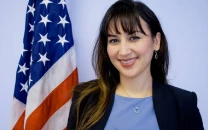Kishanganga project: Victory claims cloud final arbitration award
ICA sets minimum flow of Kishanganga river at 9 cumecs.

KHEP envisages a dam built on the Kishanganga River that would divert a substantial quantity of water to a hydroelectric project near Bonar Nullah. The water flow would then return to Jhelum and flow downstream to Pakistan. SOURCE: INTERNATIONAL COURT OF ARBITRATION
In its final ruling on the controversial Kishanganga hydroelectric project, the International Court of Arbitration (ICA) has insisted that India maintain nine cubic metres per second (cumecs) of water in the Kishenganga River at all times.
At the same time, the arbitration body allowed New Delhi to build the dam in Indian-administered Kashmir.
During a press conference on Saturday, Pakistan’s Indus Water Commissioner Mirza Asif Baig declared that the final award was rendered in Pakistan’s favour. Indian officials, however, insisted that the final arbitration was in their favour.
“The ICA has allowed India to construct the dam and also allowed them to divert the water [to Pakistan],” Baig said, summarising the court’s decision.
The court also ruled that India has to ensure that the minimum flow of water in the Kishanganga-Neelum River remains at or above nine cumecs at all times, so that it can mitigate adverse effects on Pakistan’s environment and hydroelectric projects. The remaining water can be used by India for producing hydroelectricity.
The Kishanganga hydroelectric project (Khep) envisages a dam built on the Kishanganga River – a tributary of River Jhelum on the Indian side – that would divert a substantial quantity of water through a 22-kilomtre long tunnel to a hydroelectric project near Bonar Nullah – another tributary of the Jhelum in India. The water flow would then return to River Jhelum through the Wular Lake and then flow downstream to Pakistan.
The dispute was on the design and operations of the dam, which Pakistan said were in violation of the Indus Water Treaty. There were three major appeals filed by Pakistan at ICA: first, the flow of water to be at a minimum of 10 to ideally 100 cumecs towards Pakistan’s Neelum-Jhelum River; second, to permit Pakistan to have an access of monitoring of water; and last, restrict India to divert the water to its hydroelectric project near Bonar Nullah.
ICA decided to give nine cumecs as that “would be sufficient to maintain the natural flows throughout the dry months of December, January, and February”, according to the final award.
Interestingly, the court admits that the value of the decided minimum flow is “somewhat severe in environmental terms [for Pakistan]...[but] in light of the right of India to develop hydroelectric power, and the associated right to operate the KHEP effectively, such an approach represents an appropriate balance between the needs of the environment and India’s right to power generation.”
This “associated right” of India had been determined by the partial award rendered by the ICA in February this year. In its findings, the ICA had noted that India had “coupled intent with action” in the planning and construction of the Khep before Pakistan achieved the same with respect to the Neelum-Jhelum Hydro-Electric Project (NJHEP). Therefore, “the Khep had acquired priority in the right as a result”.
An Indian victory?
The Indian media welcomed the ICA final award as it allowed “India to go ahead with construction of the Kishanganga dam, over which Pakistan has raised objections”. The Indian Express claimed the decision was in New Delhi’s favour as the minimum flow of water determinded by the ICA is “is much lower than the 100 cumecs of natural flow that Pakistan wanted to maintain”.
However, the India press fails to mention that the country had asked for a minimum flow of a mere 4.25 cumecs as any flow greater than this “would seriously compromise the economic viability of the Khep”, to which the ICA disagreed.
‘Pakistan did not do its homework’
Officials claim that Islamabad was not prepared fully for this case. In May 2013, when Pakistan was asked to submit the water data based on agriculture productivity to the ICA, the country asked for a 10-day extension to submit the information. “Simply put, they failed to do so in the stipulated time, which showed the interest of Pakistani officials,” an official told The Express Tribune.
Both the partial and final awards also allude to this. “Pakistan has submitted no data on current or anticipated agricultural uses of water from the Kishenganga/Neelum,” reads page 34 of the final award. “No Pakistani agricultural use has been established as of the time at which the Khep crystallised and acquired priority.”
Water experts had been continuously criticising the government and the Indus water commissioner for their unprofessional attitude that weakened Pakistan’s case. “People who called this a victory are those people who had earlier claimed the Baglihar dam to be a victory as well, and the latter was a disaster,” said Kamal Majidullah, the adviser on water and power to former premier Yousaf Raza Gilani.
The previous government had initially asked for 20 cumecs and Pakistan changed its stance from 10 to 100 cumecs when they were asked by the ICA to provide hydrological data, giving the court a 90% window, he said.
They sent their arguments to the legal team only for editing and it is because of this careless attitude that the decision was not in our favour, Majidullah added.
Published in The Express Tribune, December 22nd, 2013.



















COMMENTS
Comments are moderated and generally will be posted if they are on-topic and not abusive.
For more information, please see our Comments FAQ